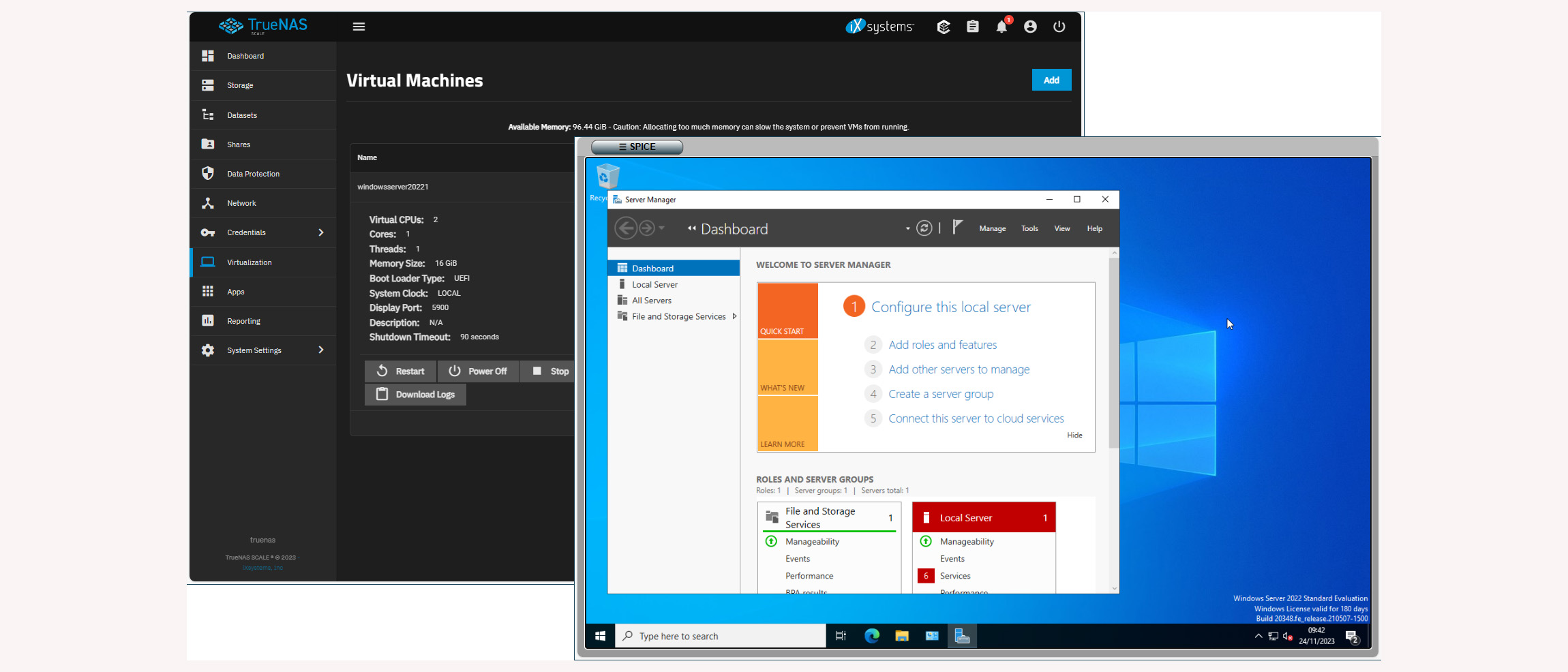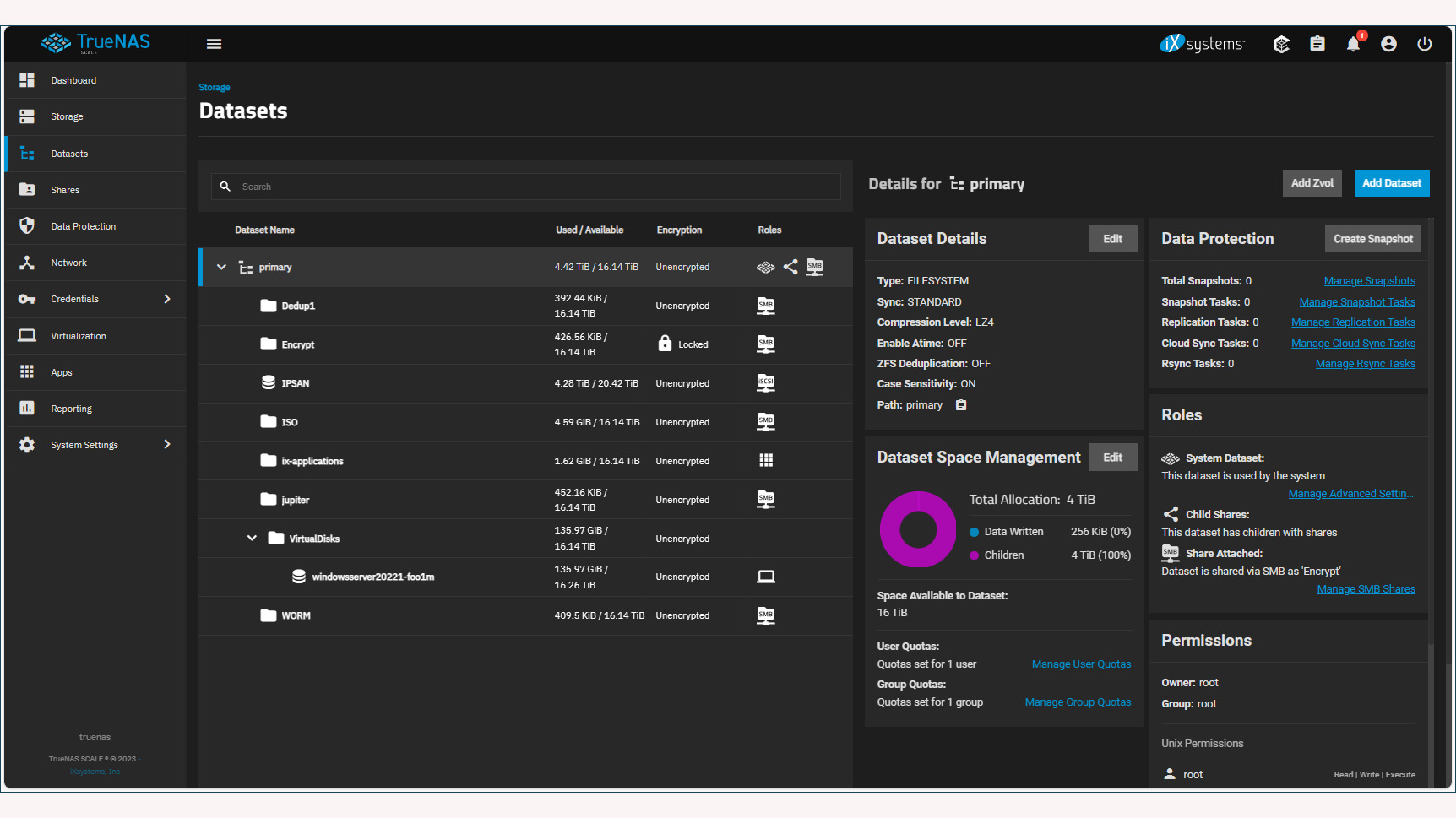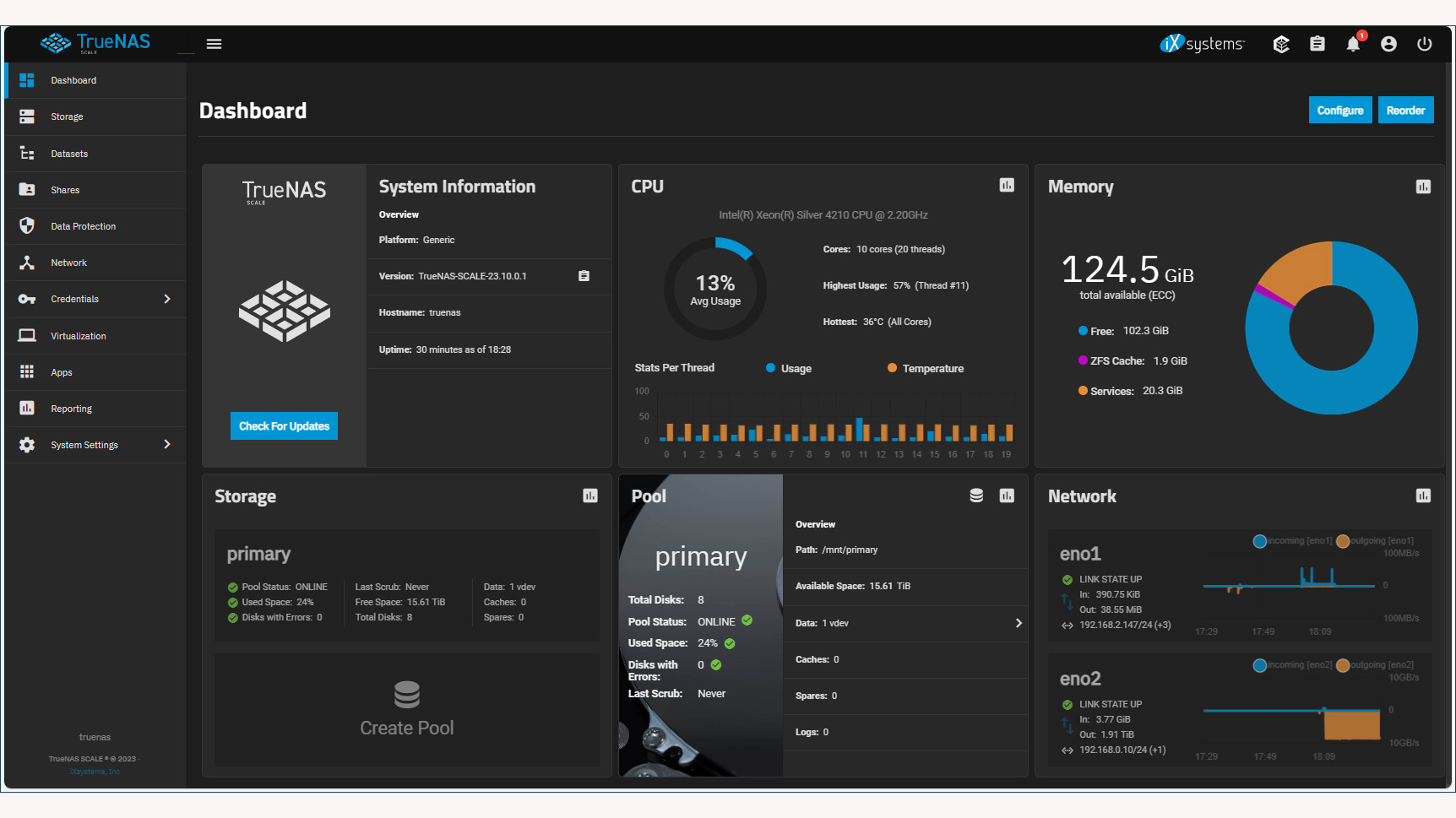OWC Jupiter Callisto review: Affordable and reliable unified storage
A TrueNAS scale-powered storage appliance with a big capacity and a great set of features

-
+
Good value
-
+
TrueNAS Scale OS
-
+
Top 10GbE NAS performance
-
+
Unified storage
-
+
Big storage expansion potential, Data protection features
-
-
Below-par iSCSI write speeds

Businesses looking for a NAS appliance offering a unified storage solution are faced with a big choice of vendors but OWC (Other World Computing) stands out for several compelling reasons. Comprising 8 and 16-bay rack-mount appliances, its Jupiter Callisto models deliver powerful hardware packages plus a rich set of enterprise-class storage features all offered at competitive prices.
READ MORE

One of the most notable features is the iXsystems TrueNAS Scale operating system at their hearts. Many businesses and enthusiasts will undoubtedly be familiar with TrueNAS Core (formerly FreeNAS) software but the Scale version is aimed at much larger environments such as data centers and delivers a lot more storage features with a sharp focus on scalability.
Both use the highly reliable OpenZFS file system but whereas TrueNAS Core is based on FreeBSD, Scale is built on Debian-Linux. Key features are support for clustering, scale-up and scale-out operations, integral virtualization services, and the ability to run K8s (Kubernetes) or Docker apps.
You don't need to worry about relying only on community support for TrueNAS Scale either. OWC provides full customer support for all aspects of the Jupiter Callisto including deployment and troubleshooting plus the price includes a three-year hardware warranty extendable to five years.
OWC Jupiter Callisto review: Hardware
We review the 8-bay Callisto model which is presented as a 2U rack server and comes ready for action as the price includes eight 4TB Toshiba enterprise-class MG08 SATA HDDs preinstalled in hot-swap carriers. Peek round the back and you'll find a pair of mirrored 480GB OWC Mercury Extreme Pro SATA SSDs dedicated to the OS.
Under the lid, it all looks nice and tidy with the Supermicro X11SPi-TF motherboard sporting a 2.2GHz 10-core Xeon Scalable Silver 4210 CPU mounted by a large active heatsink. TrueNAS Scale memory requirements are more than covered as all Callisto models come with a generous 128GB of DDR4 ECC upgradable to 512GB.
RELATED RESOURCE

Discover why current security approaches might not be working
DOWNLOAD NOW
The HDD backplane is hooked up to a Broadcom SAS/SATA PCIe HBA with RAID functions handled by TrueNAS. Our system was supplied with all drives configured as a Z2 array which is the equivalent of RAID6, but you can opt for stripes, mirrors, Z1 (RAID5), or Z3 for triple parity.
A Broadcom PCIe card looks after storage expansion and its dual mini-SAS3 ports can handle up to seven 8 or 16-bay OWC Jupiter Kore disk shelves allowing raw capacity to be boosted to an impressive 2.5PB. The appliance comes with dual embedded 10GbE copper ports and the three spare PCIe slots can be used to add extra 40GbE or 100GbE cards.
OWC Jupiter Callisto review: 10GbE performance
For NAS performance testing, we created a share on the appliance and mapped it over 10GbE to a Dell PowerEdge T640 Xeon Scalable tower server running Windows Server 2022. We saw excellent NAS speeds with Iometer reporting sequential read and write rates of 9.3Gbit/sec with random rates settling comfortably at 9.3Gbits/sec and 9.2Gbits/sec.
The random test results are of particular interest as these show how efficient the TrueNAS ZFS read and write caching is. You can keep an eye on its memory usage from the web console and during our tests, ZFS caching never consumed more than 2GB.

Real-world performance was equally impressive with copies of a 25GB test file between the NAS and server averaging read and write rates both of 9Gbits/sec. Our 22.4GB backup test folder containing 10,500 small files was secured at a speedy 2.3Gbits/sec while copying our 25GB file to an encrypted share averaged 3.4Gbits/sec.
Moving over to IP SANs, we created a 1TB iSCSI target on a new Zvol and watched Iometer report sequential and random read speeds both of 9.2Gbits/sec. Write speeds weren't quite so good though, as we recorded sequential and random rates of 6.1Gbits/sec and 6Gbits/sec.
OWC Jupiter Callisto review: TrueNAS Scale features
Data protection features are outstanding with ZFS copy-on-write (COW) delivering near unlimited NAS and iSCSI LUN snapshots. These can be easily scheduled from the main web console where you choose a dataset, set snapshot longevity in days, weeks, months, or years, and apply a predefined schedule or create your own.
Data corruption is handled transparently with end-to-end checksums, snapshots can be replicated to remote appliances, and Rsync is also supported. All popular cloud storage providers are on the TrueNAS guest list and after adding our Amazon S3 account credentials, we could create scheduled cloud sync or copy tasks for selected directories.
Space-saving options are plentiful as TrueNAS applies inline compression and you can create datasets with deduplication enabled. NAS share contents can be protected from tampering or deletion by activating WORM (write once read many) during creation and you have five minutes to tweak them before it is enforced.
The appliance can act as a virtualization host and we had no problems creating a Windows Server 2022 VM from an ISO file with it ready for action in twenty minutes. You're spoilt for choice with apps and although they aren't as business-focused as those from Qnap and Synology, you're sure to find many useful ones with 99 currently available on the app discovery console page.

The Callisto was supplied with TrueNAS Scale Bluefin and after testing, we had the opportunity to upgrade it to the latest 23.10 'Cobia' version. This heralds in a wealth of new features including a Linux 6.1 kernel, enhanced hardware support, ZFS block cloning for faster file copying plus the ability to scale to 1,200 drives on a single system for a mind-boggling 25PB storage capacity.
OWC Jupiter Callisto review: Is it worth it?
With the fully-prepped system on review costing £8,991 exc VAT, the Jupiter Callisto represents excellent value. With TrueNAS Scale at the helm, it's easy to deploy and delivers an impressive range of unified storage features with a sharp focus on data integrity.
Overall performance is very good as although IP SAN sequential and random write speeds were a tad below expectations, the Callisto delivered top NAS rates during our 10GbE tests. The Jupiter Callisto is a great choice for businesses that want a powerful and highly expandable storage appliance and OWC seals the deal with its support package and hardware warranty.
OWC Jupiter Callisto specifications (as reviewed)
| Chassis | 2U rack chassis |
| Motherboard | Supermicro X11SPi-TF |
| CPU | 2.2GHz 10-core Intel Xeon Scalable Silver 4210 |
| Memory | 128GB ECC DDR4 ECC (max 512GB) |
| Storage bays | 8 x SATA LFF/SFF (front), 2 x SATA SFF (rear) |
| Storage included | 8 x 4TB Toshiba SATA LFF HDDs, 2 x 480GB OWC SFF SSDs |
| Storage adapters | Broadcom SAS3816-IT HBA, Broadcom mini-SAS expansion card |
| RAID | TrueNAS mirror, stripe, Z1, Z2, Z3 |
| Expansion | 5 x PCIe Gen 3 (3 free) |
| Network | 2 x 10GbE RJ45 |
| Power | 2 x hot-plug 380W PSUs |
| Management | Web browser, Supermicro BMC with Gigabit |
| Warranty | 3-year limited |
Get the ITPro daily newsletter
Sign up today and you will receive a free copy of our Future Focus 2025 report - the leading guidance on AI, cybersecurity and other IT challenges as per 700+ senior executives
Dave is an IT consultant and freelance journalist specialising in hands-on reviews of computer networking products covering all market sectors from small businesses to enterprises. Founder of Binary Testing Ltd – the UK’s premier independent network testing laboratory - Dave has over 45 years of experience in the IT industry.
Dave has produced many thousands of in-depth business networking product reviews from his lab which have been reproduced globally. Writing for ITPro and its sister title, PC Pro, he covers all areas of business IT infrastructure, including servers, storage, network security, data protection, cloud, infrastructure and services.
-
 Westcon-Comstor and Vectra AI launch brace of new channel initiatives
Westcon-Comstor and Vectra AI launch brace of new channel initiativesNews Westcon-Comstor and Vectra AI have announced the launch of two new channel growth initiatives focused on the managed security service provider (MSSP) space and AWS Marketplace.
By Daniel Todd Published
-
 Third time lucky? Microsoft finally begins roll-out of controversial Recall feature
Third time lucky? Microsoft finally begins roll-out of controversial Recall featureNews The Windows Recall feature has been plagued by setbacks and backlash from security professionals
By Emma Woollacott Published
-
 The UK government wants quantum technology out of the lab and in the hands of enterprises
The UK government wants quantum technology out of the lab and in the hands of enterprisesNews The UK government has unveiled plans to invest £121 million in quantum computing projects in an effort to drive real-world applications and adoption rates.
By Emma Woollacott Published